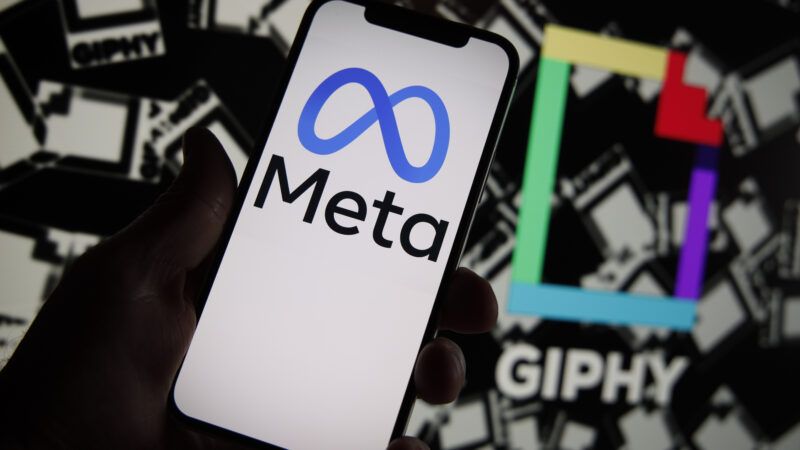The U.K. Competition Authority 'Wins,' but Consumers Lose
U.K. regulators shut down Meta/GIPHY deal in favor of their own “approved buyer.”

Competition regulators around the world are attacking some of the most successful and innovative entrepreneurs in the world—American companies. Strangely, they can't seem to agree on what markets these companies are "monopolizing" or what they have done wrong. And regulators sometimes contradict each other with their complaints.
The most recent example of this behavior comes from the United Kingdom's Competition and Markets Authority. It decided to force Meta, the parent company of Facebook, to sell GIPHY—a popular tool that makes short, animated and looped videos (GIFs) that users love to share in their social media posts—to an "approved buyer."
But were U.K. consumers harmed by the previous integration of this service? And will they be better off when a different, likely also large, company owns a mostly free online tool that people use for fun on social media?
The short answers are no and no. Much like the dog that finally catches the car, this "win" for proponents of breaking up American tech businesses will actually be a loss for the consumers they're supposed to protect. The U.K. decision will hurt the biggest benefactors of the GIPHY-Meta merger: creators and users. And because of the nature of many internet services, it is unlikely the impact will only be felt in the U.K.
This case is the latest example of policymakers prioritizing things users don't care about when it comes to tech. Regulators around the world are choosing instead to go after actions that may be beneficial or benign to consumers but don't align with their own view of what an industry should look like. But when it comes to tech policy concerns, today consumers are more concerned about data privacy, child safety, and cybersecurity than they are with "breaking up Big Tech."
So how does a Meta-GIPHY acquisition actually help consumers? It's easy to think of it just as a fun way to drop Real Housewives into your text banter with friends or to show your fandom for a favorite sports team or artist. Users benefit from the ease of inserting these fun graphics through a service like GIPHY rather than having to create them on their own. Still, there are other GIF generators users could reach for, and they typically do when they can't find what they want on GIPHY.
Social media users, however, are not GIPHY's only consumers. Brands, creators, and artists use GIPHY to design digital products that increase the awareness of their brands. Since most of GIPHY is free, that allows folks to do so at a very low cost. Still, these same creators have many other options when it comes to how to gain similar awareness, such as Snap filters or Instagram stickers. And this current model has resulted in minimal costs for its clients.
However, with a new company purchasing the service, or if it is forced to go independent, GIPHY's revenue model could completely change. Instead, GIPHY's new owner could seek a pay-per-use each time a person posts a GIF or charge a subscription fee to users. Even if the pricing model doesn't change, creators of sponsored content that supports GIPHY might not find as much value in a new owner or a less integrated service. They might then spend their resources elsewhere, leaving GIPHY to languish.
Given the lack of clear harm from a Meta-GIPHY merger, why did the U.K. decide to intervene? U.K. regulators feared that Meta was getting too big, and they wanted their "approved buyers" to own it instead. This "big is bad'' rhetoric is especially ironic given that Meta is not the behemoth it once was.
Meta's market power has been steadily declining over the past few years, largely because of new competitors. Teenagers and young adults are increasingly gravitating away from Meta-owned services like Facebook towards newer social media like TikTok and BeReal. This rapidly changing market shows that regardless of whether big is good, in the social media industry, it's often transitory. The reason no one uses Friendster or MySpace anymore is competition, not state control.
If this seems like a trivial debate—deciding which large companies own which fun, creative platforms—it should. The U.K.'s decision revolves around a narrow market ideal that doesn't reflect what consumers actually experience but rather the outcomes regulators prefer. This motivation is also evident in the Federal Trade Commission's and state attorneys general's cases against Meta.
But consider this: who is likely to buy such a product from Meta? Another large company that U.K. regulators like, especially since the sale must be approved by regulators.
There is a concerning, deeper message here, and in actions like the FTC's decision to challenge Meta's acquisition of Within, that is alarming for the future of free markets, innovation, and business. Regulators are telling successful American companies not to innovate without permission, and that even if an acquisition benefits consumers, it still may not be approved.
For decades, American antitrust law has operated under the principle known as the "consumer welfare standard." Prosecuting an antitrust violation includes a three-part test that requires clear evidence of consumer harm. This standard has allowed policymakers to look at the competition landscape through the lens of objectively protecting the consumer in the marketplace—not the competitor—and should not be so haphazardly thrown out. But many progressives question it, and European regulators certainly don't use the same test.
So a regulator won this round by forcing a leading American tech company to undo an acquisition, but at what cost to consumers? Do we want consumers to pick winners and losers in the marketplace, or do we want to permit politicians to prop up the companies they like, at the expense of American businesses?
I'd pick consumers over the government any day.


Show Comments (10)